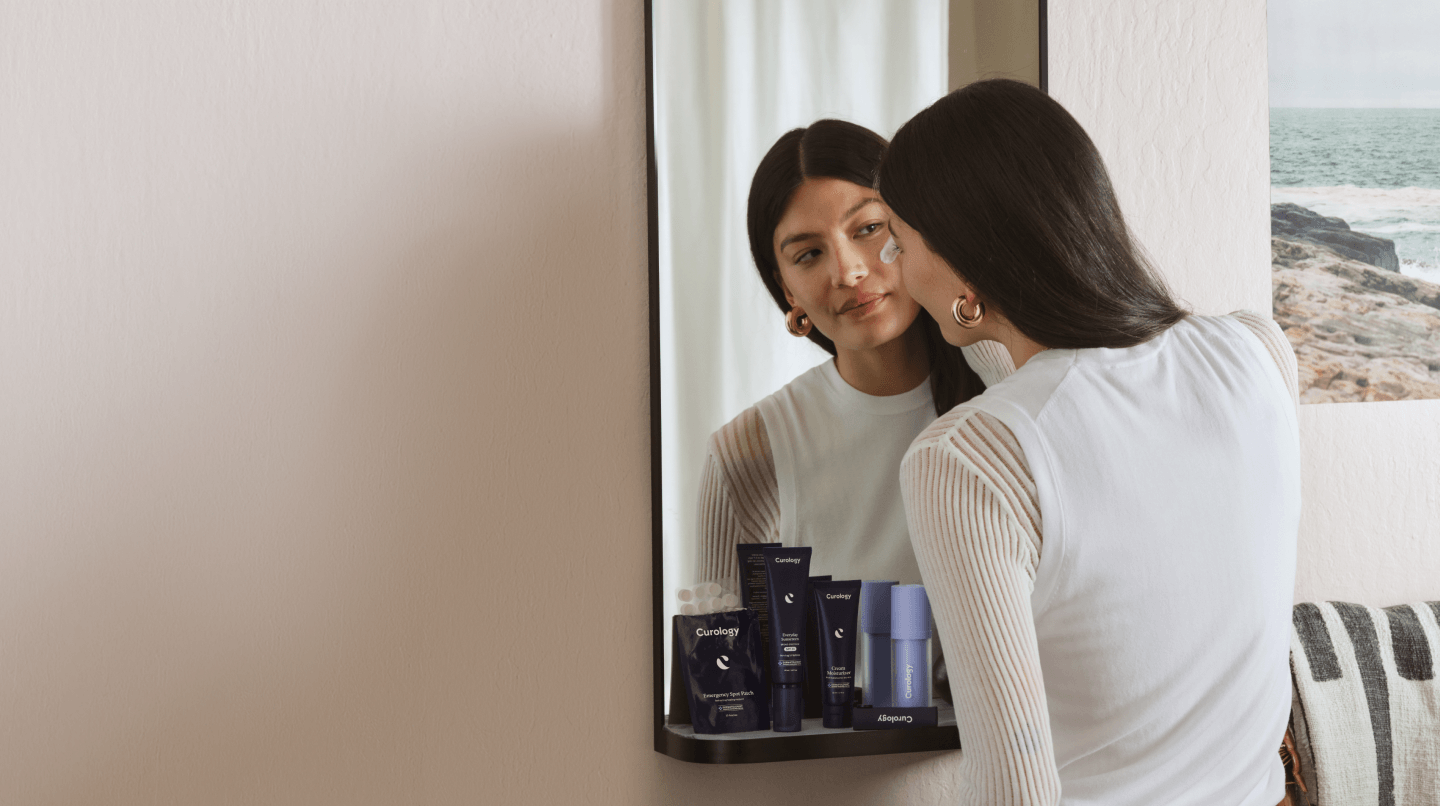How it works:
Share your skin goals and snap selfies
Your dermatology provider prescribes your formula
Apply nightly for happy, healthy skin
How it works:
How it works:
Share your skin goals and snap selfies
Your dermatology provider prescribes your formula
Apply nightly for happy, healthy skin
How it works:
Slow the signs of aging naturally
These tricks may help you hold off fine lines and age spots.



Aging is a natural part of life, but it’s normal to want to hold off the visible signs of the aging process as long as possible. And while we believe skin is beautiful at all stages of life, we understand that fine lines, wrinkles, and dark spots might not always be the most welcome addition to your complexion as the years go by.
By making mindful choices in our diet and adopting a healthier lifestyle, we have the potential to age gracefully and gently decelerate the visible signs of aging. So, if you're eager to uncover the keys to ageless beauty and health without resorting to invasive procedures, you’ll want to keep on reading!
Here, Curology’s dermatology experts will explain how you can embrace the journey of aging naturally by incorporating vitamins and herbs alongside your daily skincare routine and adopting healthy lifestyle habits.
Can you reverse aging?
Aging is a natural, non-pathological process that can result in skin changes such as loss of volume, redistribution of fat, loss of skeletal support, sagging, and changes in contour and shape. While it's currently beyond scientific and medical capabilities to entirely reverse the aging process, there are numerous ways to manage its more-unfavorable signs—particularly when it comes to your skin health.
Current research focuses on enhancing the skin's structural components—collagen, elastin, and glycosaminoglycans (GAGs). These components are pivotal in maintaining skin health and vibrancy. To promote healthy aging and delay skin aging, you can make sure your skincare routine includes photoprotection and topicals such as vitamins A, C, and E.
Vitamins for anti-aging naturally

Certain vitamins may help heal your skin and slow down the visible signs of aging when applied topically or consumed orally.
Vitamin A
Vitamin A is the first vitamin approved by the Food and Drug Administration as a topical anti-wrinkle agent that makes your skin smoother by protecting the collagen in your skin and has anti-aging effects such as wrinkle-reduction.¹
Aside from applying vitamin A, consuming vitamin A derivatives—such as carotenoids—can be beneficial for your skin as well since they help improve your skin texture and may even be able to slow down cellular aging.² You can find vitamin A in foods such as leafy greens and red peppers.³
Vitamins C and E
Vitamin C and E are important nutrients that can protect your skin from aging. They have powerful antioxidant properties, which means they help to fight against harmful substances called free radicals that can damage your skin cells.
Vitamin C can be found in fruits like oranges and strawberries.⁴ It protects the skin by neutralizing and removing oxidants such as environmental pollutants and those created after ultraviolet (UV) exposure. By doing so, it helps to maintain the health and youthfulness of your skin.
Vitamin E is present in sources such as vegetables and almonds.⁵ It plays a role in preventing two processes that contribute to skin aging: lipid peroxidation and collagen cross-linking. Lipid peroxidation is a type of cell damage, while collagen cross-linking refers to the formation of abnormal connections between collagen fibers in your skin.⁶ By inhibiting these processes, Vitamin E helps to keep skin looking young and healthy.
Both vitamins C and E work synergistically, enhancing each other's effects, and can significantly reduce UV-induced skin damage when used topically.⁷
Ingredients that promote anti-aging
In your quest to naturally defy the aging process, certain foods and skincare ingredients stand out as phenomenal allies. Nutraceuticals, potent food-derived supplements, in particular, carry significant promise.⁸ Here are a few you may want to try.
Herbs
Several herbs, such as Curcuma longa and Panax ginseng, have been used for centuries for their medicinal and health benefits, including their graceful skin aging benefits.
Curcuma longa
Curcuma longa, or turmeric, contains curcumin, a potent antioxidant with anti-inflammatory properties. This compound has been shown to suppress inflammation and oxidative stress, which are both key contributors to skin aging. Curcumin also induces a stress response in skin cells, boosting their antioxidant defenses, and demonstrates the potential to delay cellular aging.⁹
Panax ginseng
Panax ginseng, known for its medicinal value, carries the bioactive molecule ginsenoside that can improve your body's resistance to stress and also enhances immune function. For skin health, this herb has been associated with the reduction of lipid peroxidation and oxidative stress, which are both linked to skin aging.¹⁰
Polyphenols
Polyphenols such as blueberry extract, tea catechins, and black rice, are plant-based compounds that have potential benefits for your skin. Their effects on skin aging are mainly attributed to their antioxidant and anti-inflammatory properties.
Blueberry extract
Blueberry extract is rich in polyphenols, offering antioxidant potential that reduces aging symptoms and boosts cognitive function.¹¹
Tea catechins
Both oral and topical use of tea polyphenols have been shown to inhibit UV radiation on your skin. These polyphenols offer a photoprotective effect by reducing DNA damage in skin.¹²
Black rice
Black rice contains anthocyanins, potent antioxidants that have anti-inflammatory and anti-carcinogenic effects. These antioxidants have been shown to exhibit anti-aging and anti-fatigue properties.¹³
Lifestyle changes to help your skin age gracefully
Aside from eating well and using products with healthy ingredients, there are also other lifestyle changes you can prioritize to age gracefully and protect your skin.
Photoprotection: Safeguard your skin from the sun's harmful rays. Along with wearing a hat to protect your face, regular application of broad-spectrum sunscreen, even on cloudy days, can mitigate the effects of external aging.¹⁴
Exercise: Physical activity effectively counteracts the unpleasant symptoms associated with aging. While, of course, it doesn't halt aging, it softens many of its adverse systemic and cellular effects.¹⁵
Stay Hydrated: Maintaining good hydration might help decelerate the aging process, though further research is required.¹⁶ Despite the lack of direct medical evidence linking water intake to skin health, staying hydrated is generally beneficial for your body, so you should always make sure you’re drinking plenty of water.
Pamper your skin: Research shows that consistently following a skincare routine designed for sensitive skin can reduce the signs of aging, including improving hydration, wrinkle reduction, and elasticity, with minimal side effects.¹⁷
Start your anti-aging journey with Curology

You can help your skin age gracefully by living a healthy lifestyle, and by applying the right products and ingredients. At Curology, we offer HydroTretᴿˣ , a custom formula for anti-aging specially designed to help reduce the signs of aging.
It's uniquely formulated to support healthy aging skin by addressing common concerns such as fine lines, wrinkles, and loss of elasticity. Infused with high-quality ingredients, HydroTretᴿˣ targets the visible signs of aging, providing your skin with the nourishment it needs to maintain a bright, healthy appearance.
Get your personalized skincare routine with Curology
Get your personalized skincare routine with Curology


This exceptional cream not only hydrates skin but also encourages a smoother, firmer, and more even complexion over time. With consistent use, HydroTretᴿˣ aims to restore skin's natural resilience, helping it bounce back from daily stressors.
Turn the tide against aging and give your skin the best defense possible. Experience HydroTretᴿˣ, where science meets skincare, and start your journey to a radiant and youthful complexion today. Start your trial today!*
FAQs
Donna McIntyre, a nurse practitioner notes, “While you cannot completely reverse aging skin, you can certainly enjoy healthy aging! Adopting a balanced diet, keeping skin protected from the sun, exercising regularly, and using the right skincare products can help maintain your skin's elasticity.” Natural ingredients like tea and antioxidants from fruits and vegetables may also help protect and nourish your skin, reducing the appearance of fine lines and wrinkles.
The best natural approach for anti-aging is a holistic lifestyle, which includes a nutrient-rich diet and regular exercise. Antioxidant-rich ingredients and foods, with nutrients like vitamins C and E, help combat free radicals, while a healthy lifestyle can help slow the aging process.
To make your skin look younger, consume a nutrient-dense diet rich in antioxidants, vitamins, and minerals, and follow a consistent simple skincare routine with gentle exfoliation and moisturization. Make sure you protect your skin from sun damage by wearing sunscreen with SPF 30 or higher daily for overall skin health and radiance.
P.S. We did the homework so you don’t have to:
Zasada, M. and Budzisz, E. Retinoids: active molecules influencing skin structure formation in cosmetic and dermatological treatments. Advances in Dermatology and Allergology. (August 2019).
Dhanjal, D.S., et al. Plant Fortification of the Diet for Anti-Ageing Effects: A Review. Nutrients. (2020, September 30).
Office of Dietary Supplements. Vitamin A and Carotenoids. National Institutes of Health. (2022, June 15).
Telang, P.S. Vitamin C in dermatology. Indian Dermatol Online J. (April-June 2013).
Dhanjal, D.S., et al. Plant Fortification of the Diet for Anti-Ageing Effects: A Review. Nutrients. Ibid.
Dhanjal, D.S., et al. Plant Fortification of the Diet for Anti-Ageing Effects: A Review. Nutrients. Ibid.
Dhanjal, D.S., et al. Plant Fortification of the Diet for Anti-Ageing Effects: A Review. Nutrients. Ibid.
Dhanjal, D.S., et al. Plant Fortification of the Diet for Anti-Ageing Effects: A Review. Nutrients. Ibid.
Dhanjal, D.S., et al. Plant Fortification of the Diet for Anti-Ageing Effects: A Review. Nutrients. Ibid.
Dhanjal, D.S., et al. Plant Fortification of the Diet for Anti-Ageing Effects: A Review. Nutrients. Ibid.
Dhanjal, D.S., et al. Plant Fortification of the Diet for Anti-Ageing Effects: A Review. Nutrients. Ibid.
Dhanjal, D.S., et al. Plant Fortification of the Diet for Anti-Ageing Effects: A Review. Nutrients. Ibid.
Dhanjal, D.S., et al. Plant Fortification of the Diet for Anti-Ageing Effects: A Review. Nutrients. Ibid.
Krutmann, J., et al. Daily photoprotection to prevent photoaging. Photodermatology, Photoimmunology & Photomedicine. (November 2021).
Garatachea, N., et al. Physical Exercise as an Effective Antiaging Intervention. Biomed Research International. (2017, March 29).
Dmitrieva, N.I., et al. Middle-age high normal serum sodium as a risk factor for accelerated biological aging, chronic diseases, and premature mortality. E BioMedicine (2023, January 2).
Spada, F., et al. Use of formulations for sensitive skin improves the visible signs of aging, including wrinkle size and elasticity. Clinical Cosmetic and Investigational Dermatology. (2019, June 6).
Donna McIntyre is a board-certified nurse practitioner at Curology. She obtained her Master of Science in Nursing at MGH Institute of Health Professions in Boston, MA.
*Cancel anytime. Subject to consultation. Results may vary.

Curology Team

Donna McIntyre, NP-BC
Related Articles
Choosing the right sunscreen: Why non-comedogenic options are a game-changer for clear skinIs your makeup pilling? Here’s how to help prevent it from happeningThe ultimate guide to face exfoliators: Our 5 picks for glowing skinWhat’s the deal with Curology?Sunscreen for pregnancy: Which one should you use?Popular Articles
Ask Curology: Is my cold breaking me out?Slugging: The dermatologist-approved skincare hack going viral on TikTokTretinoin vs retinol: What’s the difference?How to create a self-care routine that actually sticksYour 2023 skincare horoscopeTry prescription skincare
Get routine essentials


Face what’s next with Future-ProofRx
Face what’s next with Future-ProofRx
- Skin texture
- Fine lines
- Wrinkles
- Dark spots
- Dullness
$29.95/month